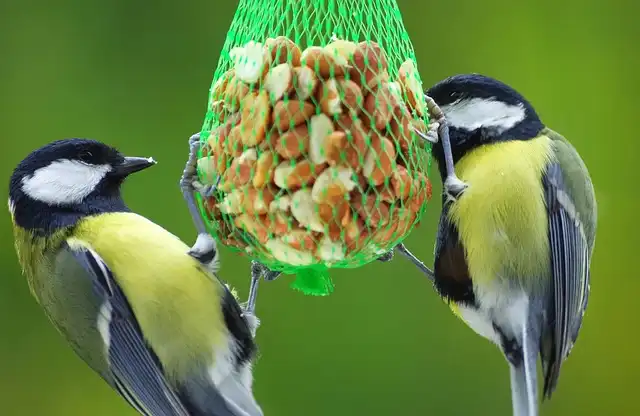Apples & Pears: Boost Garden Birds’ Health This Fall/Winter

Apples and pears offer crucial energy for garden birds in fall/winter. Rich in vitamins & fiber, these fruits aid digestion, feather health, & winter preparation. Avoid moldy fruits, and supplement with nuts/seeds.
Get in touch with me with news and provides from other Future brandsReceive email from us in behalf of our relied on partners or sponsorsBy sending your details you accept the Terms & Conditions and Personal privacy Policy and are aged 16 or over.
‘Opting for natural apples – benefit factors if they’re from your very own orchard – makes certain the chemical pesticide exposure is restricted. It is essential to remove the seeds and core of apples and pears, as these contain cyanide, which can be unsafe for our feathered pals,’ he states.
‘ They also have minerals like potassium, vital for total physical function. The high fibre content, especially in pears, help birds’ digestion and gut health and wellness, and can even minimize stress-induced feather-pecking.’
‘ Birds love apples particularly due to the fact that they’re unmissable and eye-catchingly brilliant – they discover sweet treats irresistible, like much of us! Luckily, they’re not only visually enticing however additionally extremely healthy,’ says James Ewens, horticulture and wildlife specialist at Eco-friendly Feathers.
The cooler months are one of one of the most essential times to offer an aiding hand to the birds which visit your yard, which is why wild animals professionals desire you to omit these two fruits this fall – and you can pick them up for under ₤ 1 at your local supermarket.
‘ Fall feeding isn’t just about maintaining birds fed, it assists them prepare for winter. Youthful birds expanding solid after fledging, and grownups constructing fat gets, both gain from additional nourishment,’ clarifies Anton Baskerville, Wild Animals Specialist at Woodlands.co.uk.
Why Apples and Pears Benefit Birds in Winter
This is why wildlife professionals advise omitting apples and pears for your feathered pals this autumn and winter. A natural power boost, below’s why these fruits will be more than a pleasant reward for your yard birds.
When the temperature levels plunge, research study shows that little birds can lose up to their body weight in just one evening. Research by the British Trust fund for Ornithology found that blue tits can shed 5% of their body weight over night. As a result of this, feeding birds can help them accumulate their fat books in time for freezing temperature levels.
I ‘d bet that I do not recognize any individual who doesn’t take pleasure in bring in birds to their yard. From offering bug control to entertainment via their birdsong, birds are a pleasure to be about and a crucial part of any kind of wild animals garden. Research reveals that little birds can shed up to their body weight in just one evening when the temperature levels drop. Since of this, feeding birds can aid them develop up their fat gets in time for freezing temperature levels.
Apples and pears give birds a reputable source of power when other foods are scarce.
Serving Apples & Pears Responsibly
‘ It is essential to make sure that whatever you’re supplying, you clean your feeders on a regular basis, and it’s specifically vital when you’re feeding fruits, as we do not intend to motivate mould development, and if you’re tossing fruits out in the yard, ensure that you tidy up routinely to not attract undesirable insects.’
‘ These fruits container be fed to birds when they’re a little bit past their prime for our intake, however we shouldn’t be offering moldy or ruined fruits to the birds,’ says Maria Kincaid, in-house Ornithology Research Expert for clever birdfeeder, FeatherSnap.
While apples and pears are an excellent energy resource, they should enhance a bird’s well balanced diet plan of nuts, seeds, or pests. You need to use apples and pears to offer your yard birds a wellness increase, rather than it being the only item on your bird buffet food selection.
I ‘d bet that I do not know anybody who does not delight in attracting birds to their garden. From giving pest control to entertainment by means of their birdsong, birds are a joy to be about and a vital part of any kind of wildlife garden. Yet with that said delight comes duty, that includes providing a dependable resource of food during winter months.
Kezia Reynolds signed up with the Perfect Home group as News Author in September 2024. After finishing from City, College of London in 2022 with a bachelor’s degree in journalism, Kezia kicked off her profession investing two years dealing with women’s weekly publications. She is always on the lookout for the most recent home news, finding you the very best patterns and bargains – so you don’t miss out on a point!
The Nutritional Power of Fruits
We have a responsibilty to look after the wildlife that visits our yard, and supplying healthy and balanced food is just one of the very best ways to do this. Will you be dishing out apples and pears for your garden birds?
‘ The straightforward sugars and carbs in apples and pears give a high-energy snack for birds, vital for those chilly months. Pears and apples also consist of vitamin A, supporting eye and plume health and wellness of birds, and vitamin C to support their immune system.
‘ As temperature levels drop, pests come to be harder to discover, and many berries are eaten or iced up. When various other foods are scarce, apples and pears offer birds a reliable resource of energy. This added nutrition aids them keep body weight and keeps them energetic, sharp, and all set to survive wintry nights.’
1 apples and pears2 bird health
3 garden birds
4 natural food source
5 wildlife care
6 winter feeding
« Furniture Trends & Newsletter Updates: King Living ExpansionClean Bedding: Health & Hygiene Tips for Better Sleep »
